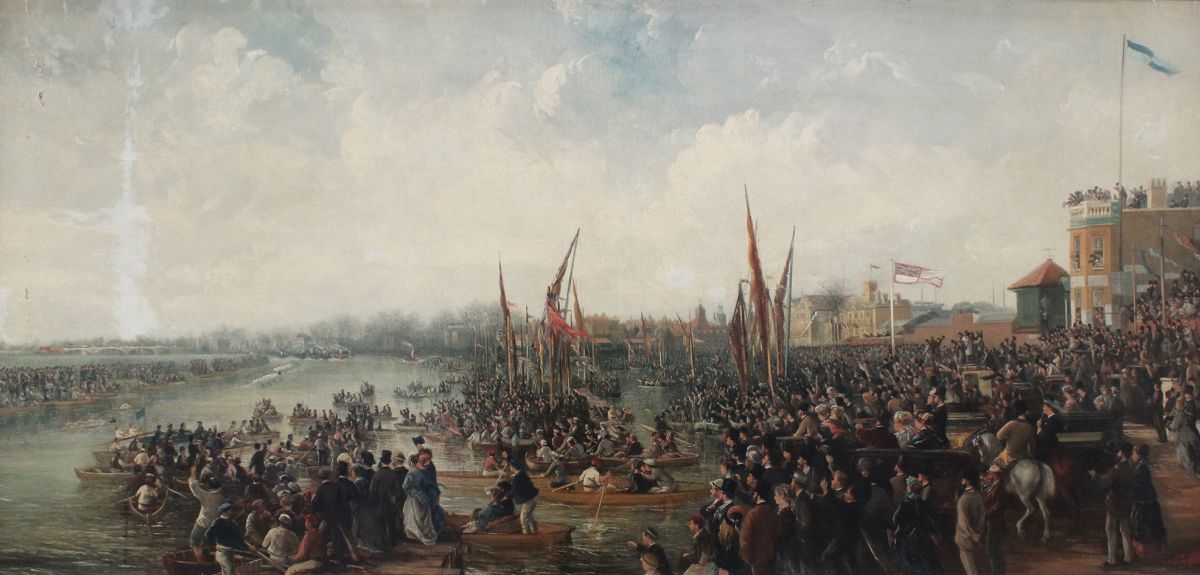
Oxford wins the Boat Race...of 1863
This weekend the Thames hosted an historic Boat Race, with the women's crew racing on the same course as the men for the first time. Professor Sally Shuttleworth, a historian at Oxford, leads 'Diseases of Modern Life', a project which explores the medical, literary and cultural responses in the Victorian age to the perceived problems of stress and overwork.
In a guest post for Arts Blog, Professor Shuttleworth compares yesterday's Boat Race to the race of 1863.
With the crowds, the launches, and the world's media watching, the Oxford and Cambridge boat race seems a fairly riotous occasion. Such disruption as we see, however, including Trenton Oldfield's protest in 2012, is as nothing compared to the experience in the mid-nineteenth century.
In 1863, the medical reformer Dr Benjamin Ward Richardson depicted the scenes on the banks of the Thames on the day of the boat race, with maniac equestrians charging through the crowds, cannons firing and blowing off fingers, and even noses: ‘Women screaming from balconies and windows: children falling from garden-walls, or rolling into the stream to be fished out by dogs, half drowned or dead’.
On the river itself, following the rowing boats, were ‘heavy, black, roaring, filibustering steamers, calling themselves “Citizens,” and so weighted with human yelling craft that one side is in the water and the helmsman thinks it a consolation that it could not possibly be a worse fate to go over altogether’.
How sedate we seem now, with our mildly drunken crowds, and carefully managed flotilla of launches, carrying media-men, and a few lucky university members. No lost fingers or noses, no half-drowned children; no black steamers freighted with yelling hordes.
Even the finish, with our excited television announcers proclaiming the results to the world, seems tame by comparison with the Victorian experience: ‘Pandemonium let loose, in such a burst of human throat, cannon throat, steam throat, as charges the very clouds with thunder, and telegraphs to Hercules the news that “Oxford has won”’.
This is the age of the telegraph, but Richardson depicts a wonderful mix of modes of communication: horses instantly dash off in all directions carrying the news, whilst the air is filled with pigeons, ‘ticketed “Oxford has won”’, flying away at sixty miles an hour, and that instrument of modernity, the telegraph, ‘dins every station in the kingdom’ with the news of Oxford’s victory.
Richardson's own interest in this scene of mayhem lies not so much in the spectacle itself, as in its implications for health. The above descriptions come from an article in the newly-founded Social Science Review on the consequences of physical overwork.
The Victorians, as many historians have noted, were deeply concerned about the possibilities of over-pressure on the brain from new modes of work, but less attention has been paid to their concerns with its physical correlate, over-pressure on the body.
Richardson is in favour of exercise, but in moderation. He warns of the dangers of the ‘competitive animal physics’ exhibited in the boat race. His verdict on the triumphant crew is alarming: there is not one 'who will not die so many years sooner by so much effort performed beyond his natural power'. Although extreme in its rhetoric, his argument chimes with current popular and medical concerns about excessive exercise.
In an interesting parallel with contemporary tales of individuals who move from sedentary lifestyles to over-active gym memberships, with fatal results, Richardson recounts the story of men who have ‘waxed fat’ and have joined the Volunteer force (the equivalent of our Territorial Army) "to work themselves down”, and have instead destroyed their health, and worse.
In opposition to the tenets of muscular Christianity, and the supreme faith placed in physical exercise and drill as training for the imperial mission, Richardson suggests that the Volunteer system, 'instead of imparting national strength, … is elaborating national weakness, by enforcing in excess exertion which, in moderation, would be most useful'.
Over the next decades, the Oxford and Cambridge boat race became the focus of repeated medical investigations in an attempt to determine whether placing such a strain on the body did indeed injure health.
Richardson, founder and President of the National Cycling Society, was strongly in favour of exercise, but retained a healthy scepticism towards the benefits derived from the boat race itself: 'Two boats holding crews half naked, said crews tugging might and main to gain a ridiculous staff, opposite and belonging to a “public” house.'
Would he have been surprised to learn that the tradition (with minor modifications) continues unabated to this day?
Diseases of Modern Life: Nineteenth-Century Perspectives is a five year research project, led by Professor Sally Shuttleworth, and funded by the European Research Council.